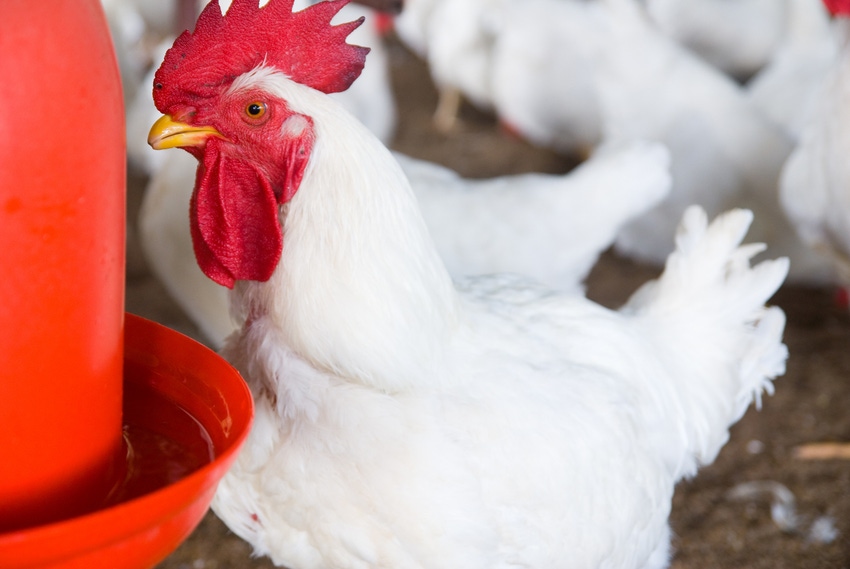
USDA’s Animal and Plant Health Inspection Service (APHIS) has confirmed the presence of highly pathogenic avian influenza (HPAI) in birds in two states – a flock of commercial broiler chickens in Fulton County, Kentucky, near the Tennessee border, and a backyard flock of mixed species birds in Fauquier County, Virginia.
Samples from two Kentucky flocks were tested at the Breathitt Veterinary Center Laboratory and samples from the affected Virginia flock were tested at the Virginia Department of Agriculture and Consumer Services Harrisonburg Regional Animal Health Laboratory, both part of the National Animal Health Laboratory Network. The Virginia and Fulton County, Kentucky cases were confirmed at the APHIS National Veterinary Services Laboratories (NVSL) in Ames, Iowa. The Breathitt Veterinary Center Laboratory also obtained a non-negative avian influenza test result on the samples from a Webster County turkey flock, and NVSL confirmation is pending.
Kentucky Agriculture Commissioner Ryan Quarles said the Kentucky Department of Agriculture is working closely with animal health officials at both the federal and state government to contain the incidents. “Protecting the health of livestock and poultry in the commonwealth is a top priority of the Kentucky Department of Agriculture. We encourage everyone to visit kyagr.com/HPAI for additional information and updates as they come.”
APHIS is working closely with state animal health officials in Kentucky and Virginia on joint incident responses.
State officials in both states quarantined the affected premises, and birds on the properties will be depopulated to prevent the spread of the disease. Depopulation is complete in Virginia. Birds from the flocks will not enter the food system.
As part of existing avian influenza response plans, federal and state partners are working jointly on additional surveillance and testing in areas around the affected flocks.
“It’s critical that we work together to prevent the spread of this virus,” Tennessee State Veterinarian Dr. Samantha Beaty said. “We will begin testing and surveillance of commercial and backyard flocks within the surveillance zone immediately. In Tennessee, poultry owners should report unexpected deaths to the State Vet’s office.”
APHIS said the United States has the strongest AI surveillance program in the world and that USDA is working with its partners to actively look for the disease in commercial poultry operations, live bird markets and in migratory wild bird populations.
“Anyone involved with poultry production from the small backyard to the large commercial producer should review their biosecurity activities to assure the health of their birds,” the agency said, adding that it has materials about biosecurity, including videos, checklists, and a toolkit available here.
United Egg Producers emphasized the importance of biosecurity following the latest discoveries. “This new detection clearly indicates HPAI is in the Mississippi Flyway, and it is unusual because it has impacted broilers, which were not affected in the 2015 outbreak. Without question, biosecurity on farms across the country is of critical importance.”
USDA will report the findings to the World Organisation for Animal Health (OIE) as well as international trading partners. USDA also continues to communicate with trading partners to encourage adherence to OIE standards and minimize trade impacts. OIE trade guidelines call on countries to base trade restrictions on sound science and, whenever possible, limit restrictions to those animals and animal products within a defined region that pose a risk of spreading disease of concern.
APHIS will continue to announce the first case of HPAI in commercial and backyard flocks detected in a state but said it will not announce subsequent detections in the State. All cases in commercial and backyard flocks will be listed here.
In addition to practicing good biosecurity, all bird owners should prevent contact between their birds and wild birds and report sick birds or unusual bird deaths to State/Federal officials, either through their state veterinarian or through APHIS’ toll-free number at 1-866-536-7593. APHIS urges producers to consider bringing birds indoors when possible to further prevent exposures. The Animal Health Protection Act authorizes APHIS to provide indemnity payments to producers for birds and eggs that must be depopulated during a disease response. APHIS also provides compensation for disposal activities and virus elimination activities.
About the Author(s)
You May Also Like






